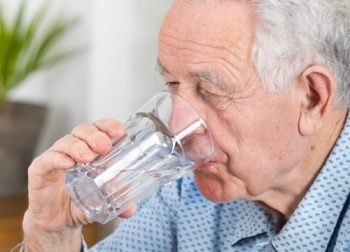Source: Thailand Medical News Dec 13, 2019 6 years, 2 months, 2 weeks, 18 hours, 13 minutes ago
A new Penn State study suggests that
lack of hydration in
older adults may also relate to
cognitive performance, not just the typical effects of feeling sluggish and having a headache.

The medical researchers investigated whether hydration levels and water intake among older adults was related with their scores on several tests designed to measure cognitive function. They found that among women, lower hydration levels were associated with lower scores on a task designed to measure motor speed, sustained attention, and working memory. They did not find the same result for men.
The study findings were recently published in the
European Journal of Nutrition.
Dr Hilary Bethancourt, a postdoctoral scholar in biobehavioral health and first author on the study told
Thailand Medical News, "The study gives us clues about how hydration and related drinking habits relate to cognition in older adults. This is important because older adults already face increased risk of cognitive decline with advancing age and are often less likely than younger adults to meet daily recommendations on water intake."
Dr Asher Rosinger, Ann Atherton Hertzler Early Career Professor in Global Health, said the researchers found similar results when the participants were overhydrated.
Dr Rosinger, who also directs the Water, Health, and Nutrition Laboratory and was senior author on the study added, "We found a trend suggesting overhydration may be just as detrimental to
cognitive performance as dehydration for older adults. Because of this, being in the 'sweet spot' of hydration seems to be best for cognitive function, especially for tasks requiring sustained attention."
The researchers stated that scientists have long suspected that dehydration may have an effect on cognitive performance. However, previous studies have largely focused on young, healthy people who are dehydrated after exercise and/or being in the heat.
Dr Bethancourt said that because exercise and elevated ambient and body temperatures can have their own, independent effects on cognition, she and the other researchers were interested in the effects of day-to-day hydration status in the absence of exercise or heat stress, especially among older adults.
Dr Bethancourt added, "As we age, our water reserves decline due to reductions in muscle mass, our kidneys become less effective at retaining water, and hormonal signals that trigger thirst and motivate water intake become blunted. Therefore, we felt like it was particularly important to look at cognitive performance in relation to hydration status and water intake among older adults, who may be underhydrated on a regular basis."
In the study, the researchers used data from a nationally representative sample of 1271 women and 1235 men who were 60 years of age or older. Data were collected by the Nutrition and Health Examination Survey. Participants gave blood samples and were asked about all foods and drinks consumed the previous day. The researchers calculated hydration status based on concentrations of
sodium, potassium, glucose, and urea nitrogen in participants' blood. Total water intake was measured as the combined liquid and moisture from all beverages and foods.
Research participants also completed three tasks designed to measure different aspects of cognition, with the first two measuring verbal recall and verbal fluency, respectively.
A final task measured processing speed, sustained attention, and working memory. Participants were given a list of symbols, each matched with a number between one and nine. They were then given a list of numbers one through nine in random order and asked to draw the corresponding symbol for as many numbers as possible within two minutes.
Dr Bethancourt said that when they first plotted the average test scores across different levels of hydration status and water intake, there appeared to be a distinct trend toward higher test scores in relation to adequate hydration and/or meeting recommended water intake. However, much of that was explained by other factors.
Dr Bethancourt elaborated, "Once we accounted for age, education, hours of sleep, physical activity level, and diabetes status and analyzed the data separately for men and women, the associations with hydration status and water intake were diminished. A trend toward lower scores on the number-symbol test among women who were categorized as either underhydrated or overhydrated was the most prominent finding that remained after we accounted for other influential factors."
Dr Bethancourt noted that because the data was cross-sectional, they can't be sure whether suboptimal hydration levels are causing cognitive impairment or if people with impaired cognition are just more likely to be under- or overhydrated.
The researchers were also unsure why they failed to see the same associations among men. Still, she said the results raise interesting questions.
Dr Bethancourt said "It was interesting that even though the test of attention, processing speed, and working memory took only a few minutes, it was the one most strongly associated with lower hydration levels. Other research has similarly suggested that attention may be one of the cognitive domains most affected by hydration status. This left us wondering what the effects of inadequate hydration might be on more difficult tasks requiring longer periods of concentration and focus."
Dr Rosinger said the findings suggest older adults may want to pay close attention to their hydration status, by both consuming enough liquids to avoid dehydration as well as ensuring adequate electrolyte balance to avoid overhydration.
Dr Rosinger commented, "Because older adults may not necessarily feel thirsty when their body is reaching a state of underhydration and may be taking diuretics that can increase salt excretion, it is important for older adults and their physicians to better understand the symptoms of being both under- and overhydrated,"
Dr W. Larry Kenney Marie Underhill Noll Chair in Human Performance, and Dr David M. Almeida, professor of human development and family studies, also participated in this work.
Reference
: Hilary J. Bethancourt et al, Cognitive performance in relation to hydration status and water intake among older adults, NHANES 2011–2014,
European Journal of Nutrition (2019).
DOI: 10.1007/s00394-019-02152-9
